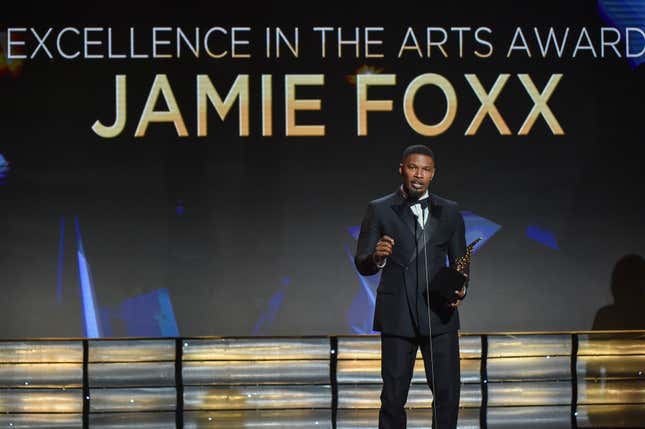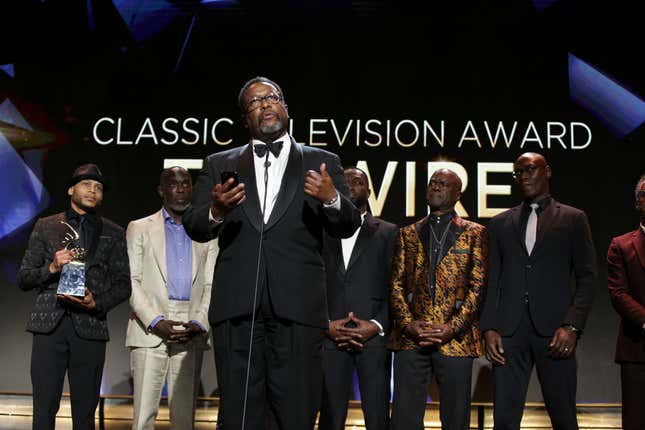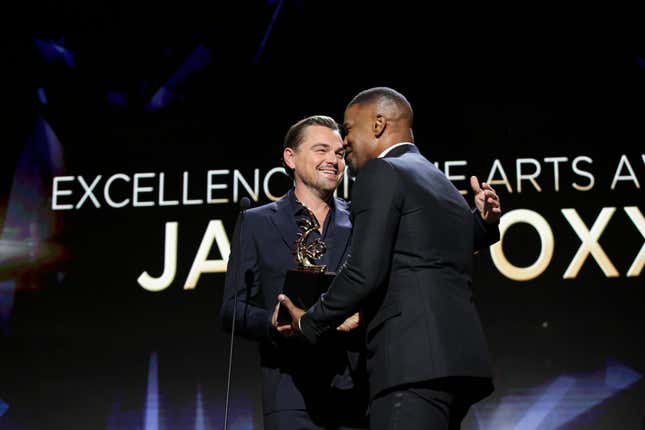
The “category” was excellence, and Black Hollywood showed up and showed out.
On Sunday night, the Beverly Hilton was bustling with black actors—I like to call them blacktors—producers and press gathered for the ABFF Honors, a space that Black Hollywood built to recognize our excellence in film and television. (After all, if we don’t, who will?) I attended the ceremony as a guest of Cadillac (good looking out!), and had the opportunity to be in the midst of all of that talent.
It was the close of a celebratory weekend in Los Angeles that actually began with BET’s META (Media, Entertainment & Technology Alliance) conference on Thursday and continued on Saturday with the NAACP Image Awards, and then Sunday’s pre-ABFF Honors brunch and Honors ceremony.
This year’s honorees were Academy Award winner and acting OG Louis Gossett Jr., who received the Hollywood Legacy Award; Lena Waithe, who was honored with the Industry Renaissance Award; and Cynthia Erivo, who was acknowledged with the Rising Star Award. HBO’s “The Wire” received the Classic Television Award, with actor Wendell Pierce accepting the award on behalf of the cast.

But the night belonged to ABFF’s Movie of the Year, Just Mercy—the legal drama based on a true story that was snubbed by the Academy Awards—and Jamie Foxx, one of the movie’s leading men.
Leonardo DiCaprio made a surprise appearance at the Honors to present Foxx with the Excellence in the Arts Award, and I almost fell out of my chair. Before we go any further, who invited Leonardo DiCaprio to the ABFF Honors?! So typical of a white dude to crash the party—geesh! (For the record, I’m just joking.)
Here’s how it went down: The evening was coming to a close when an unknown presenter with some fifty-eleven accolades was announced. Out of nowhere, DiCaprio strolls onto the stage. There was an audible gasp from the audience, Foxx made a black auntie-Titanic joke (leaning into the gasp), and the crowd erupted in laughter. Who knew that Titanic and black aunties were a thing?

Foxx, the phenomenal talent that he is, thanked DiCaprio before reviving a few of his most iconic roles (read: Jamie actually got in character, saying a line-or-two per character)—fromWanda on In Living Color to Ray Charles in Ray. “I’ve done all of these characters,” Foxx said, “but one of the most important characters that I’ve done is Walter McMillan.”
McMillan was wrongfully sentenced to death in 1988 for allegedly murdering a white woman. Far too often, black and brown people find themselves facing harsh sentences or like, McMillan, wrongfully incarcerated. Foxx went on to share a touching story about his father, who spent seven years in prison for carrying $25 worth of an illegal substance.
“I didn’t go visit him because I don’t visit people in jail,” Foxx said. “I don’t like seeing that—I don’t like that image. So I wrote my father one letter. I said, ‘You get out, I’ll save your life.’”
Foxx made good on his promise, and his father has been living with him for 20 years.
“Tonight, [my father] is proud. My family is proud of my grandmother and grandfather who put everything they had as a yardman and a maid into this big-headed boy from Terrell, Texas, so he could stand in front of his incredibly talented friends from all races, all genders, all creeds, and celebrate art, the Oscar winner said with tears in his eyes. “Thank you.”
Just Mercy later took home the Movie of the Year award, and attorney Bryan Stevenson—Michael B. Jordan plays the real-life superhero lawyer the story is based on—brought the house to its feet with a riveting acceptance speech. It was everything.
“This is a glorious space. We have all of these talented people. But I hope we believe that things can get better because there is still too much inequality and injustice,” Stevenson said. “There is still too much unfairness. There’s still too many people being pushed down. There’s still too many people being marginalized. There is still too much bigotry and injustice and racism in this country. So we are, despite the specter and glamor of this place, going to still have to stand up when other people say sit down.”
Today, Stevenson works as the founder of the Equal Justice Initiative. He and his organization are dedicated to providing legal services to the poor, incarcerated and condemned. He used his last few minutes on the ABFF Honors stage to remind us that there is still more work to be done.
“I’m so grateful to all of you for honoring our film, for allowing us to have this platform, for telling the story and for recognizing what we’re trying to see. There is more justice that we have to achieve. And I’m so grateful to know so many new friends and to continue on this journey with you all.”
Amen.



